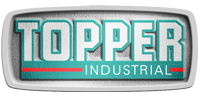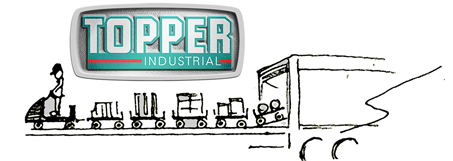The rules that OSHA has put in place for forklift operators state that they must be trained thoroughly using lectures, written material, and necessary computer based training, before they are allowed to operate any forklift machinery. They must also be given a practical lesson where hands-on training is conducted to prove their knowledge of the machinery they plan to operate in their job.
This forklift training should be conducted by an experienced and professional trainer in the organization. Lastly, an evaluation should be done at the end of the training and certification needs to be earned before an employee is licensed to operate a forklift.
When pricing a forklift fleet is purchase the costs of these training requirements are often ignored. Ironically, according to Ed Brown, found of Topper Industrial, “These training costs can exceed the cost of the equipment over a five year period. This real cost is driving serious consideration of the ForkTruck Free initiatives at manufacturing and distribution facilities across North America.”
The National Institute for Occupational Safety and Health (NIOSH) released a report stating that forklifts strike people every day in the U.S., resulting in 100 deaths and over 20,000 injuries annually. The costs incurred due to forklift accidents are over $100 million a year.
The reason for this comprehensive forklift training and certification is to avoid accidents happening as a result of inexperienced forklift operators, either to themselves or to other employees in the work place. Many industrial accidents are due to hiring of unskilled laborers or workers in an organization, or improper and insufficient training.
For that reason, OSHA conducts an annual visit, and at times surprise visits to industries to check their adherence to these regulations of safety that they put in place for forklifts. The visits are characterized by an OSHA professional’s inspection of the safety practices employed by forklift operators and their skills of operating the forklifts. This is done in a very thorough and professional way so that any mistakes on the employer’s side can be corrected to avoid accidents and assure workers of their safety in each individual work environment, from docks, to piers to warehouses.
Lack of compliance by the employer can result in a fine and in worst case scenarios the work place might be temporarily or permanently shut down until proper safety measures have been put in place. Violations that OSHA checks for and fines the particular employers for vary from safety issues on forklifts themselves, unsafe rack conditions, and mishandling of equipment by employees. There are many other safety regulations that OSHA enforces in work places, all in an effort of having safe working conditions for employees.
Brown argued that “Companies cannot mandate that a forklift operator take OSHA rules and regulations seriously. While observing proper safety saves companies money, and more importantly, saves lives, a ForkTruck Free environment is a guaranteed method to ensure compliance.”

By Thomas R. Cutler, Manufacturing Journalist for Topper Industrial – Material Handling Solutions
Visit Topper Industrial at MODEX 2016. To view video, go to: http://www.modexshow.com/attendees/youroneminute.aspx.

